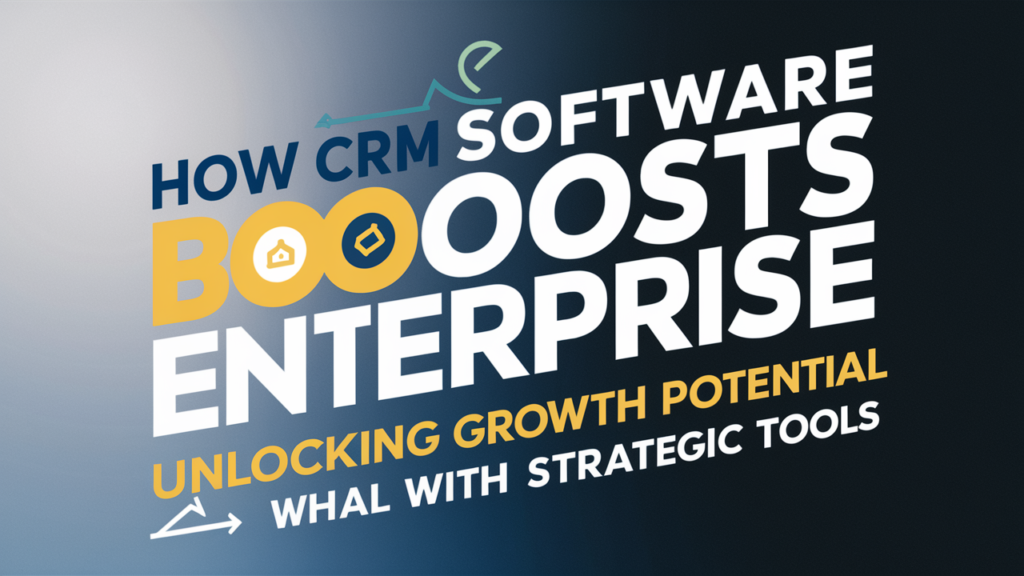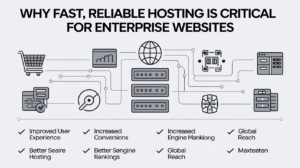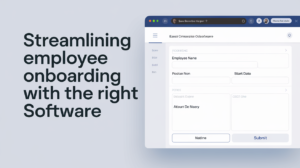In today’s highly competitive business landscape, the key to sustained sales success lies in effective Customer Relationship Management (CRM). CRM Software for enterprise sales has proven to be a game-changer for enterprises, streamlining processes, managing customer interactions, and providing actionable insights. In this post, we’ll explore how leveraging CRM software can elevate enterprise sales, discussing its features, benefits, and practical applications.
Understanding CRM Software
What is CRM Software for enterprise sales?
CRM (Customer Relationship Management) software is a powerful tool that helps businesses manage customer interactions and data efficiently. It facilitates smooth communication between a business and its customers by automating sales processes, managing customer data, and ultimately boosting customer satisfaction and sales.
Why is CRM Software Crucial for Enterprises?
For large enterprises, handling the complexity of customer data and interactions can be overwhelming. CRM software for enterprise sales provides an all-in-one solution, allowing businesses to manage customer relationships effectively and implement sales strategies that lead to better outcomes.
The Benefits of CRM Software for Enterprise Sales
1. Improved Customer Data Management
CRM software offers a centralized database where all customer information, from contact details to purchase history, is stored. This allows sales teams to easily access relevant customer data and personalize their approach, leading to better customer engagement and loyalty.
2. Enhanced Sales Automation
CRM software for enterprise sales automates repetitive tasks like sending follow-up emails, scheduling appointments, and data entry. This frees up time for sales teams to focus on high-value activities, increasing productivity and contributing to higher sales performance.
3. Better Sales Forecasting
With real-time analytics and reporting, CRM software for enterprise sales provides actionable insights into sales performance. These insights enable sales teams to forecast trends, identify opportunities, and make informed decisions, which improve resource allocation and sales outcomes.
4. Strengthened Customer Relationships
By tracking all customer interactions, CRM allows businesses to offer personalized service, fostering stronger customer relationships. This results in higher customer satisfaction, repeat business, and increased revenue.
5. Streamlined Sales Process
CRM simplifies the sales process by managing every step—from lead generation to conversion—effectively. Features like pipeline management ensure that sales teams stay organized, reducing missed opportunities and improving overall efficiency.
Features of Effective CRM Software
Comprehensive Contact Management
An effective CRM system captures and organizes all customer data in one place, offering a holistic view of the customer journey. This ensures better-informed interactions and helps sales teams quickly reference past communications.
Advanced Analytics and Reporting
CRM tools offer powerful analytics, delivering detailed reports on customer behavior, sales performance, and market trends. These insights are critical for strategic planning and decision-making.
Integration with Other Business Tools
Seamless integration with other business applications, such as email and marketing tools, is vital. It ensures that all business processes work harmoniously, providing a unified platform for customer relationship management.
Customization and Scalability
CRM software should be customizable to meet specific business needs and scalable to grow with the enterprise as it expands, ensuring that it remains relevant over time.
Implementing CRM Software: Best Practices
1. Define Your Objectives
Clarify your goals before implementation. What do you want the CRM system to achieve? Defining objectives will help you choose the right CRM and ensure it aligns with your sales strategy.
2. Choose the Right CRM
When selecting CRM software for enterprise sales, consider ease of use, feature set, integration capabilities, and support services to ensure that it meets your enterprise’s unique requirements.
3. Train Your Team
Ensure that your sales team is well-trained to use the CRM effectively. Proper training maximizes adoption and helps your team leverage the CRM’s full potential to drive sales.
4. Monitor and Optimize
Regularly review CRM performance and gather user feedback to make adjustments as needed, optimizing the system for better sales outcomes.
Real-World CRM Success Stories
Salesforce and Spotify
Spotify, a leading music streaming platform, uses Salesforce CRM to manage customer interactions and enhance its sales strategies. Salesforce’s advanced features have helped Spotify streamline its sales processes and boost customer engagement, leading to increased revenues.
HubSpot and Suzuki
Suzuki implemented HubSpot CRM to optimize its dealership network’s sales operations. HubSpot’s comprehensive features improved Suzuki’s lead management and customer interaction tracking, driving a significant increase in sales.
Conclusion
Incorporating CRM software into your enterprise sales strategy is a critical step towards modernizing your sales process. CRM tools enhance sales automation, forecasting, and customer relationship management, resulting in improved efficiency and greater sales success. By implementing best practices and choosing the right CRM, enterprises can unlock new opportunities for growth and sustain long-term success.









